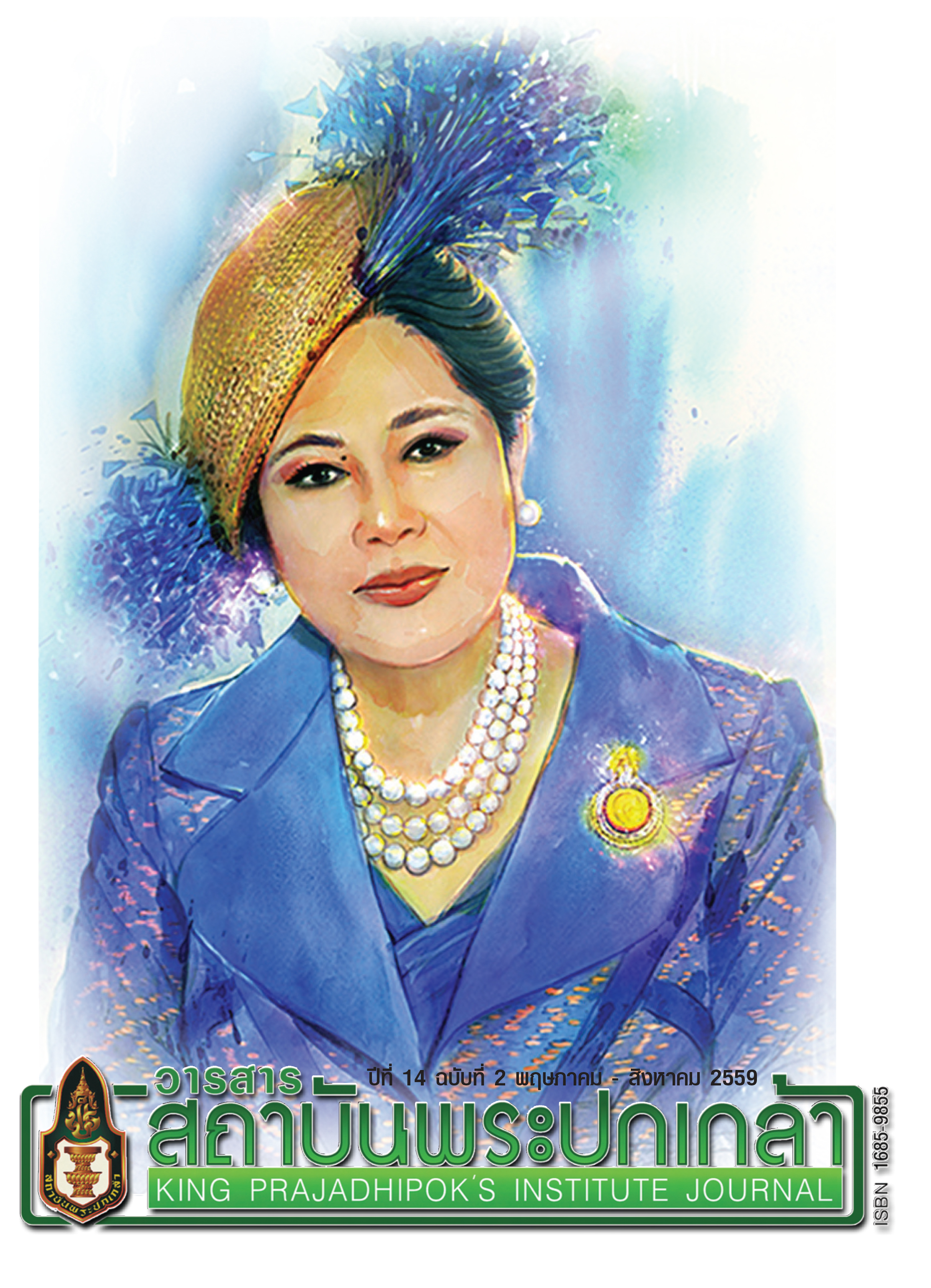Women Empowerment in Political Participation in Thailand
Main Article Content
Abstract
One significant principle of Good Governance is public participation which also emphasizes on accessible opportunity to participate in politics that moves beyond election. Women’s leadership and political participation are restricted in many countries. In Thailand women are underrepresented as the proportion of women voters are more than men, as well as in leading positions especially in politics, in the civil service, the private sector or academia. Although they have abilities as leaders and agents of change, and their right to participate equally in democratic governance, but their opportunity is still limited.
This study aims to study the factors affecting the women participation in politics in Thailand. The obstacles and best practices in many countries such as India, Indonesia are also included as well as finding the recommendations for empowering Thai women to be able to participate in politics. Data are gathered from literatures, in depth interviews of many people related, such as high ranked politicians, officials, community leaders and NGOs in both Thailand and foreign countries. Focus interviews and participatory workshops in various parts of Thailand are organized to gather data. Finally, the strategies for empowering Thai Women in Politics are developed as significant mechanisms for achievement. The result found that the factors affecting women’s participation are to enhance their own characteristic, for instance; the leadership. The factors which influence women’s political participation consist of to enhance their leadership and social responsibility for their community. Besides, the family and society should support and willing to give the opportunity to express their political potential. Thai government should have the law and policy to back up the role of women’s political participation. This research study present strategic plan and training package to bringing force to urge the women to participate in politics. The 3 strategics include Potential development and building leadership its implementation, How to create the strategic to support the role for women and its implementation and the strategic for communicating the success stories and network building.
Article Details
@ 2020 King Prajadhipok's Institute The Government Complex Commemorating All Right Reserved.
References
จุรี วิจิตรวาทการ และคณะ. (2553). รายงานการวิจัย การศึกษาแนวทางส่งเสริม การบูรณาการมิติหญิง ชายเพื่อการพัฒนาตามปรัชญาเศรษฐกิจพอเพียง. กรุงเทพฯ : สำนักงานกิจการสตรีและสถาบันครอบครัวและศูนย์สาธารณประโยชน์และประชาคม สถาบันบัณฑิตพัฒนบริหารศาสตร์.
ถวิลวดี บุรีกุล และปัทมา สูบกำปัง. (2544). ผู้หญิงไทยกับการเมืองหลังการมีรัฐธรรมนูญแห่งราชอาณาจักรไทย พ.ศ. 2540. นนทบุรี : สถาบันพระปกเกล้า.
ทิชา ณ นคร และคณะ. (2545). ผู้หญิงกับรัฐธรรมนูญ : บันทึกการเดินทางสู่ความเสมอภาค. กรุงเทพฯ : เครือข่ายผู้หญิงกับรัฐธรรมนูญ.
พรเพ็ญ เพชรสุขศิริ และอลงกรณ์ คูตระกูล. (2549). โครงการศึกษาข้อคิดเห็นของผู้มีส่วนร่วมโดยตรงต่อการมีส่วนร่วมในการปกครองส่วนท้องถิ่นของสตรีในประเทศไทย.
สถาบันพระปกเกล้า. (2556). ทศธรรม : ตัวชี้วัดการบริหารกิจการบ้านเมืองที่ดี. พิมพ์ครั้งที่ 6. กรุงเทพฯ : สถาบันพระปกเกล้า.
สมสุดา ผู้พัฒน์ และ จุฬารัตน์ วัฒนะ. (2556). บทบาทสตรีกับพื้นที่ทางการเมือง โครงการติดตามและประเมินผลการดำเนินงานด้านสตรีและครอบครัว. สำนักงานกิจการสตรีและสถาบันครอบครัว. กรุงเทพฯ : มหาวิทยาลัยเกษตรศาสตร์.
สุธีรา วิจิตรานนท์ และเมทินี พงษ์เวช. (2546). มิติหญิงชายในด้านการเมืองและการบริหาร. สถาบันวิจัยบทบาทหญิงชายและการพัฒนา. บริษัท เอดิสัน เพรส โปรดักส์ จำกัด.
สำนักงานกิจการสตรีและสถาบันครอบครัว. (2555). รายงานสรุปผลการอบรมเพิ่มทักษะการบริหารงานแก่สมาชิก อบต. เทศบาลสตรี ใน 76 จังหวัด.
Cattleya, Leya. (2010). Review of Increasing Women’s Political Participation and Strengthening Good Governance in Indonesia Program. The Asia Foundation’s program funded by the Royal Norwegian Embassy, Jakarta.
Chege, R. (n.d.). A Curriculum for the training of trainers in gender mainstreaming. Nairoboi, Kenya: African Women’s Development and Communication Network By IMAGEMATE.
Dahlerup, Drude, (2008). “Gender Quotas in Politics: Empowerment from Above or from Below?” In Women’s Political Participation and Representation in Asia: Obstacles and Challenges, edited by Iwanaga, Kazuki. Copenhagen: NIAS Press.
Farzana Bari. (2005). Women’s Political Participation: Issues and Challenges. Division for the dvancement of Women (DAW), United Nation. Bari .2005, pp. 3-5.
Iwanaga, Kazuki. (2008). Women’s Political Participation and Representation in Asia: Obstacles and Challenges. Copenhagen: NIAS Press.
Inter-Parliamentary Council. (2013). “Plan of Action to Correct Present Imbalances in the Participation of Men and Women in Political life, “Inter-Parliamentary Union. Accessed April 21, 2013, http://www.ipu.org/wmn-e/planactn.htm.
Oliver H. Woshinsky. (1995). Culture and Politics. Eaglewood Cliffs, NJ: Prentice Hall. pp. 106-121.
Zabaleta Kaehler, Carla, and Paula De Dios Ruiz. (2008-2009). Gender analysis of women’s political participation in 7 South-East Asian countries: Bangladesh, Cambodia, the Philippines, Indonesia, Sri Lanka, East Timor and Vietnam. Regional Gender Programme in South-East Asia – Stage II, Enjambra Contra la Explotaci?n Sexual and Paz y Desarrollo.
สำนักงานกิจการสตรีและสถาบันครอบครัว. (2556). แผนปฏิบัติราชการ 4 ปี พ.ศ. 2555 – 2558 ฉบับทบทวนเมื่อ 21-23 มกราคม สืบค้นจาก www.women-family.go.th/wofa/modules/ website/upload/article/dba9429ef6ad985bacb3379f05cd4622
สำนักงานคณะกรรมการสิทธิมนุษยชาติ. (2556). พันธกรณีระหว่างประเทศอนุสัญญาว่าด้วยการขจัดการเลือกปฏิบัติต่อสตรีในทุกรูปแบบ. สืบค้นจาก: http://www.nhrc.or.th/2012/wb/th/index.php
Cliveti, Minodora. (2005). “Mechanisms to ensure women’s participation in decision-making.” Parliament Assembly, Council of Europe. Accessed April 21, 2013, http://assembly.coe.int/ASP/Doc/XrefViewHTML.asp?FileId=11068&Language=EN
Inter-Parliamentary Council. (1994). “Plan of Action to Correct Present Imbalances in the Participation of Men and Women in Political Life,” Inter-Parliamentary Union. accessed April 21, 2013, http://www.ipu.org/wmn-e/planactn.htm
IPU. (2014). Women in Politics. Available on http://www.ipu.org/wmn-e/classif.htm
National Democratic Institute for International Affairs. (2013). Increasing Women’s Political Participation Though Effective Training Programs: A Guide to Best Practices and Lessons Learned. Available on https://www.ndi.org/files/Training-Manual-Increasing-WPP-Through-Effective-Training-Programs.pdf.
The Centre for Women in Governance. (2009). Strengthening Women’s Participation in Government ad Civil Society Uganda. Available on http://www.cewigo.org/report/strengthening-womens-participation-government-and-civil-society-uganda
United Nations News Centre. (2013). “Women’s political participation must be accelerated through quotas – UN official,” accessed April 21, 2013, http://www.un.org/apps/news/story.asp?newsid=41445&cr=un.
Sita Aripurnami. สัมภาษณ์โดย ถวิลวดี บุรีกุล, ปัทมา สูบกำปัง, และรัชดี แสงมหะหมัด, Women Research Institute, 14 กันยายน 2554.


